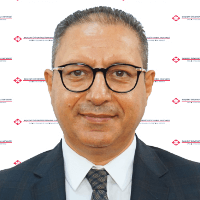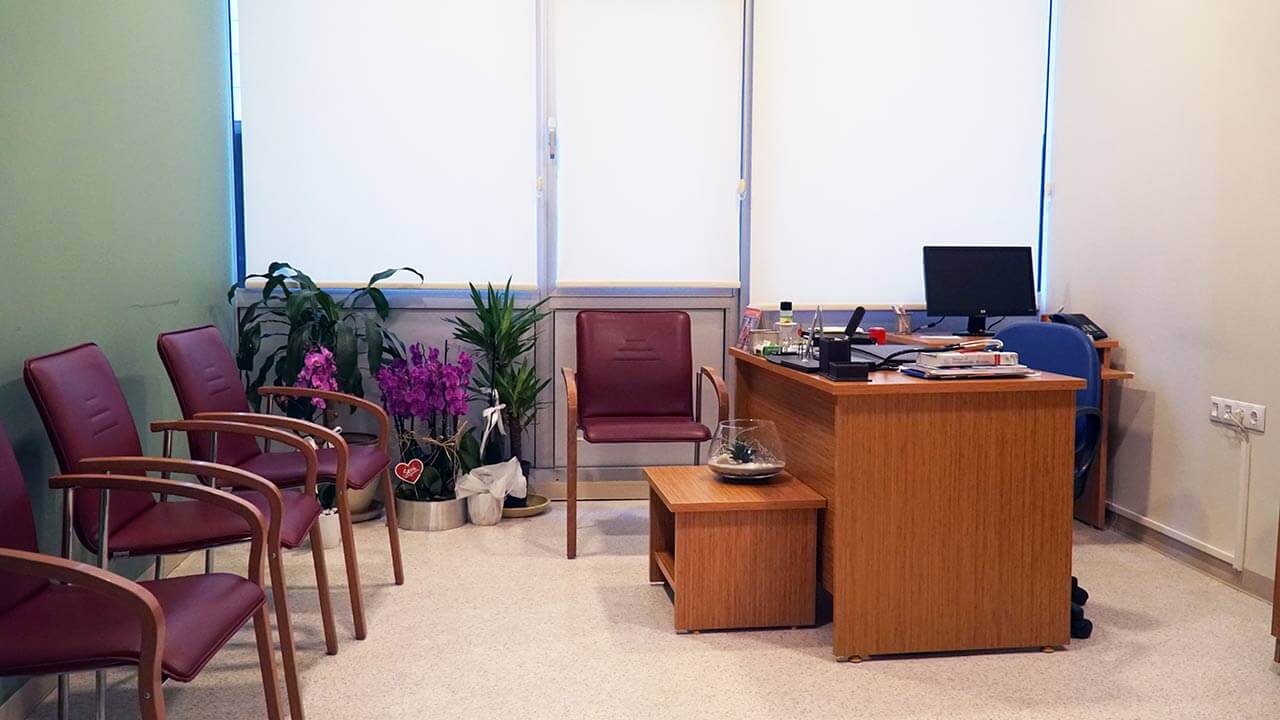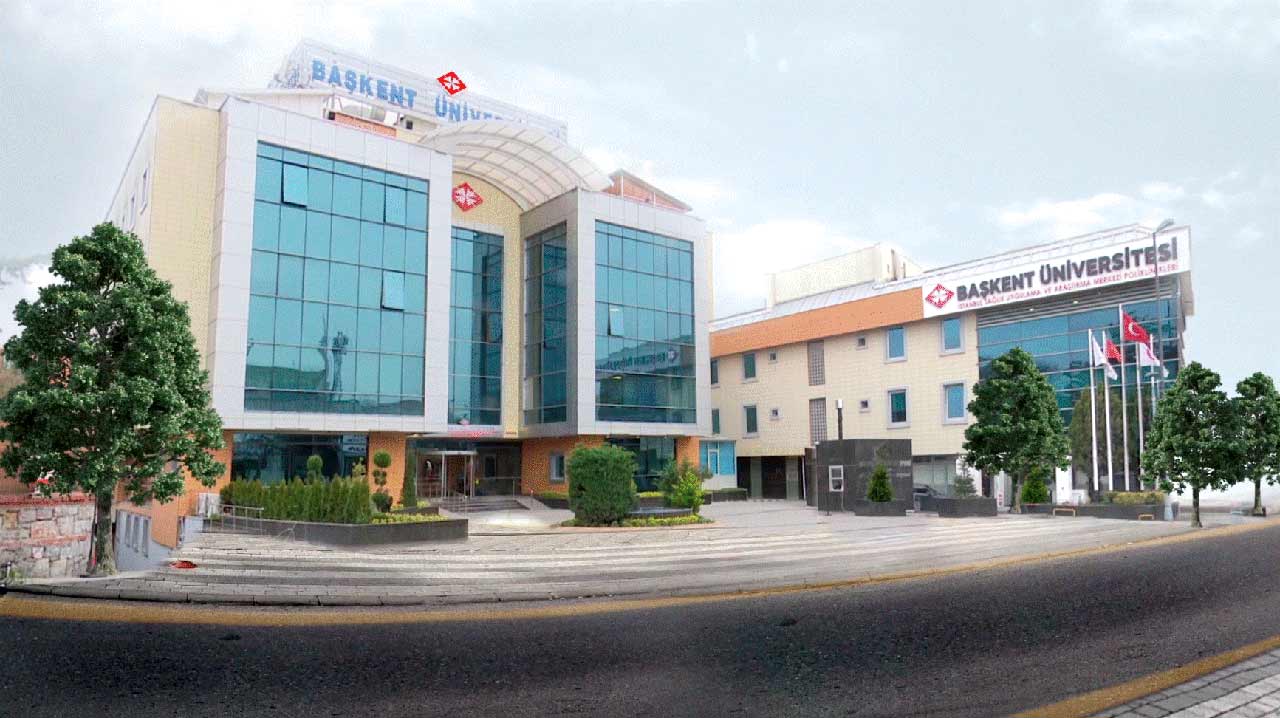
The program includes:
- Initial presentation in the clinic
- clinical history taking
- review of medical records
- physical examination
- laboratory tests:
- complete blood count
- general urine analysis
- biochemical analysis of blood
- inflammation indicators (CRP, ESR)
- indicators of blood coagulation
- tumor markers (CEA, CA19-9, CA125)
- gynecological examination
- ultrasound scan: pelvis, abdomen
- CT scan/MRI of the abdomen and pelvis
- preoperative care
- aa Vinci hysterectomy
- histological and immunohistochemical
examination of the removed tissues - symptomatic treatment
- control examinations
- the cost of essential medicines and materials
- nursing services
- full hospital accommodation
- explanation of future recommendations
How program is carried out
During the first visit, the physician will conduct a clinical examination and go through the results of the available diagnostic tests. After that, you will undergo the necessary additional examination, such as the assessment of liver and kidney function, ultrasound scan of the abdominal and pelvic organs, CT scan and MRI. Based on the results of an additional examination, the physician will clarify the stage of the oncological process, choose the surgical technique and the type of anesthesia.
Surgery with the da Vinci robot starts with general anesthesia. After anesthesia, the surgeon makes small incisions through which he inserts the manipulators of the da Vinci robot and a video camera into the pelvic cavity. Using manipulators, the doctor dissects the ligamentous apparatus of the uterus, ligates or coagulates the blood vessels and, finally, cuts off the uterus from the vagina. The video camera continuously transmits a three-dimensional image of the operating field in 12-fold magnification to the monitor. The uterus is removed through the vagina, and the vaginal stump is sutured with an atraumatic needle. The surgeon installs a drain into the abdominal cavity and finishes the operation.
Hysterectomy with the da Vinci robot allows not only to remove the uterus, but also to fix the preserved ovaries in the anatomical position. If radiation therapy is planned after the hysterectomy, the surgeon can dislocate the ovaries from the irradiation region and maintain their function. Excessive body mass, which usually complicates endoscopic surgery, is also not a direct contraindication to robotic intervention.
After the completion of the operation, you will be transferred back to the ward, under the supervision of the attending physician and nursing staff. Due to the minimal invasiveness of the operation and the short duration of general anesthesia, you will not need to stay in the intensive care unit for a long time.
Finally, the attending physician will evaluate the results of control examinations, schedule the date of discharge from the hospital and give you detailed recommendations for further follow-up and treatment.
Required documents
- Medical records
- MRI/CT scan (not older than 3 months)
- Biopsy results (if available)
Service
You may also book:
 BookingHealth Price from:
BookingHealth Price from:
About the department
The Department of Gynecology, Gynecologic Oncology and Obstetrics at the Baskent University Hospital Istanbul offers the full range of high-quality medical services for the prevention, diagnostics and treatment of diseases of the female reproductive system. The department also specializes in integrated management of pregnancy, childbirth and postnatal care both for mother and child. The primary focus of the department's clinical activities is the provision of high-quality medical care to patients with gynecologic cancers – uterine, cervical, ovarian, fallopian tube and vulvar cancer. The department's specialists are known as the best doctors in the field of their expertise and regularly demonstrate excellent treatment results. The high treatment success rates are facilitated not only by the professionalism of the medical staff, but also by the high-tech equipment of the department. Most gynecological interventions are performed using sparing laparoscopic techniques that require only a few miniature skin incisions. In addition, the department's specialists perform robot-assisted interventions using the innovative da Vinci surgical system. The department is headed by Prof. Dr. med. Murat Naki.
The specialists in general gynecology are responsible for clinical gynecologic examinations, ultrasound scanning, colposcopy, hormone tests, treatment of menstrual disorders, menopause and its manifestations, treatment of infections of the genitourinary system in women, as well as sexually transmitted diseases, treatment of uterine fibroids and endometriosis. When treating most gynecologic pathologies, the department's gynecologists strive to apply only conservative methods. As a rule, drug therapy is sufficient. However, uterine fibroids or endometriosis may require surgical methods. The treatment regimen depends on the severity of the pathological process. Each clinical case is unique, and therefore the treatment regimen is appointed individually.
The department's specialists deal with the detection and treatment of gynecologic cancers every day. As a rule, women start searching for medical care not at the initial stage of cancer, so to completely cure the patient or achieve a long-term remission, a comprehensive and interdisciplinary approach is required. Each clinical case is considered at the tumor board, which involves not only gynecologists, but also oncologists, radiologists, chemotherapists, radiation therapists and other specialists. The department's doctors set themselves the task to elaborate an optimal treatment regimen, which will not only give good results, but will be the most sparing for the female body. When treating gynecologic cancer in women of childbearing age, the specialists always try to preserve the reproductive organs, so the woman has the opportunity to become a mother in the future. The treatment of cancers of the female genital organs is based on the surgical removal of the tumor. The department performs all kinds of modern gynecologic operations to treat cancer, namely, classic open surgery, minimally invasive operations and robot-assisted interventions using the da Vinci surgical system. The technique of the surgical procedure is determined according to the stage of cancer, the size and localization of the tumor, the patient’s general health and the anatomical features of her body. Whenever possible, the department's specialists try to avoid open surgery, which requires a longer postoperative recovery than sparing laparoscopic interventions. However, surgery alone is not enough to cure cancer. The surgical treatment is complemented by chemotherapy, radiation therapy, hormonal therapy and other treatments. In the case of advanced gynecologic cancers, the patients are provided with high quality palliative care, which aims to relieve pain and improve the quality of life.
Obstetric care is also an important focus of the department's clinical activities. The regular screening of pregnancy and monitoring of fetal development take place in modern diagnostic rooms with state-of-the-art ultrasound devices. Women give birth in comfortably equipped birthing rooms with all the necessary aids for a successful childbirth. If necessary, the woman in labor is provided with epidural anesthesia to relieve pain. The department also offers various relaxation techniques, acupuncture, homeopathy, aromatherapy, etc. All of these methods relieve pain during childbirth. With appropriate clinical indications, the obstetricians perform C-section.
The department's range of medical services includes:
- Diagnostics and treatment of general gynecologic diseases
- Menstrual disorders
- Menopause and its manifestations
- Hormonal imbalance caused by gynecological diseases
- Uterine fibroids
- Endometriosis
- Cervical dysplasia
- Ovarian cysts
- Polycystic ovary syndrome
- Infectious diseases of the genitourinary system in women
- Sexually transmitted diseases
- Urinary incontinence
- Pelvic organ prolapse
- Diagnostics and treatment of gynecologic cancers
- Uterine cancer
- Cervical cancer
- Ovarian cancer
- Fallopian tube cancer
- Vulvar cancer (cancer of the external female genitalia)
- Obstetric services
- Integrated management of pregnancy
- Delivery (vaginal delivery and C-section)
- Pain relief during labor (epidural anesthesia, acupuncture, relaxation techniques, etc.)
- Postnatal care both for mother and baby
- Other services
The department's therapeutic options include:
- Conservative treatment methods
- Drug therapy
- Uterine artery embolization
- Laser therapy
- Chemotherapy
- Radiation therapy
- Hormone therapy
- Surgical treatment methods
- Open surgical interventions
- Hysterectomy
- Myomectomy
- Surgical removal of ovarian cysts
- Salpingectomy (surgery to remove fallopian tubes)
- Oophorectomy (surgery to remove ovaries)
- Burch procedure to treat urinary incontinence
- Surgery to treat uterine cancer
- Surgery to treat cervical cancer
- Surgery to treat ovarian cancer
- Surgery to treat fallopian tube cancer
- Laparoscopic interventions
- Hysterectomy, including vaginal one
- Tubal ligation
- Surgery to remove ovarian cysts
- Surgery to treat ectopic pregnancy
- Surgery to treat bladder and uterine prolapse
- Surgery to remove uterine fibroids
- TOT sling procedure to treat urinary incontinence
- Robot-assisted interventions (da Vinci surgical system)
- Surgery to remove ovarian cysts
- Surgery to remove uterine fibroids
- Surgery to remove foci of endometriosis
- Hysterectomy to treat uterine cancer
- Surgery to treat fallopian tube obstruction
- Open surgical interventions
- Other conservative and surgical treatments
Curriculum vitae
Prof. Dr. med. Murat Naki is the Head of the Department of Gynecology, Gynecologic Oncology and Obstetrics at the Baskent University Hospital Istanbul. The doctor studied medicine at the Faculty of Medicine of Istanbul University. After receiving a medical degree, he worked as Assistant Physician in the Department of Gynecology and Obstetrics at the Goztepe Training and Research Hospital. For 5 years he worked as Assistant Physician and also became Research Fellow at the Faculty of Medicine of the Istanbul University. During the same period, Dr. Murat Naki had an internship at the Memorial Sloan Kettering Cancer Center in New York. This was followed by the position of gynecologist and obstetrician at the Lutfi Kirdar Kartal Training and Research Hospital. The specialist also became the Founder of the Department of Gynecology and Obstetrics at the Bagcilar Training and Research Hospital in Istanbul. In 2011, Dr. Murat Naki completed his board certification in gynecologic oncology, and in 2012 he received the title of Assistant Professor.
The specialist is one of the best gynecologists in Turkey. He became the first specialist in the country to perform 3D laparoscopy and is also Turkey's leading specialist in gynecologic surgery with the da Vinci surgical system.
Prof. Murat Naki is a member of many professional medical societies, particularly, the Turkish Society of Obstetrics and Gynecology, the Turkish Society of Gynecologic Oncology, the International Gynecologic Cancer Society, the Turkish Society of Gynecological Endoscopy, the European Society of Gynaecological Oncology and the Turkish-German Gynecological Association.
Photo of the doctor: (c) Istanbul Başkent Hospital
About hospital
The Baskent University Hospital Istanbul is a progressive medical complex, whose primary purpose is to provide medical care of the highest quality in a pleasant and comfortable environment. The hospital is part of the prestigious Turkish Baskent University Healthcare Group, whose outstanding achievements are known not only nationally, but also in the international medical arena. The medical group was founded by Prof. Dr. med. Mehmet Haberal, who was the first specialist in Turkey who performed kidney transplantation from a living donor. The hospital in Istanbul opened its doors to the first patient on February 23, 2007, and since then has gained a solid reputation among the top medical facilities in Turkey.
The medical complex has a high-tech base both for accurate diagnostics and effective treatment according to international standards. Special attention should be given to the medical staff of the hospital. The hospital employs professors and doctors with colossal clinical experience. They successfully cope even with especially complex clinical cases. Many specialists underwent training in leading medical centers in America and Europe.
The hospital represents almost all branches of modern medicine. The areas of special competence of the hospital are transplant surgery, cardiac surgery, general surgery, urology, otolaryngology and other medical disciplines. The medical complex has the prestigious ISO 9001:2015 certificate, which is awarded only to the hospitals with impeccable quality of medical service.
The hospital has 125 beds for patient hospitalization, including additional beds in Intensive Care Units, Dialysis and Palliative Care Sections. Every year, the hospital admits more than 7,000 inpatients and more than 180,000 outpatients. In addition, the doctors annually perform more than 4,000 surgical interventions of varying degrees of severity in state-of-the-art operating rooms of the hospital. The medical facility admits many patients from foreign countries, which confirms its high credibility at the international level.
Photo: (c) Istanbul Başkent Hospital, (с) depositphotos
Accommodation in hospital
Patients rooms
The patients of the Baskent University Hospital Istanbul live in comfortable rooms with modern design. All patient rooms are made in light colors and have an ensuite bathroom with shower and toilet. The standard patient room furnishings include an automatically adjustable bed, a bedside table, a wardrobe for clothes, a table and chairs for receiving visitors, as well as a telephone and a TV.
Meals and Menus
The patient and the accompanying person are offered a daily choice of three menus. If you are on a specific diet for any reason, you will be offered an individual menu. Please inform the medical staff about your dietary preferences prior to the treatment.
Further details
Standard rooms include:
Accompanying person
During the inpatient program, an accompanying person may stay with the patient in the room or at a hotel. Our managers will help you choose the most suitable option.
Hotel
During the outpatient program, the patient may stay at the hotel. Our managers will help you choose the most suitable option.






